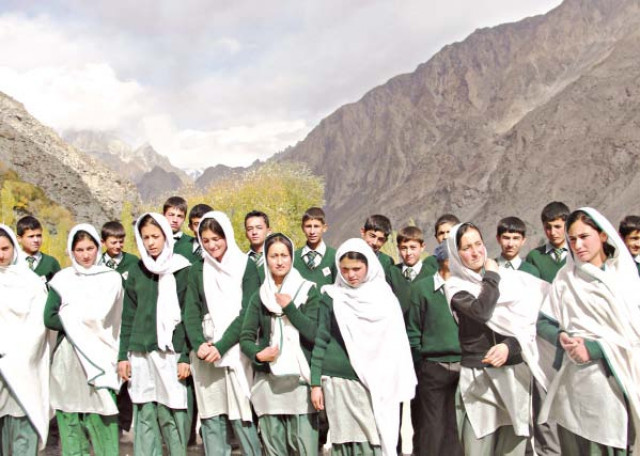Future of students in Gojal valley in limbo
Attabad landslide left parents unable to pay for children’s education, schools,the salary for already underpaid staff.

“Around 65 per cent of the students here have not paid their fees for more than five months”, Nazir Ahmed Bulbul, principal of the Al-Amyn Model School Gulmit, said.
Parents left without means to earn their livelihoods are unable to pay for their children’s education. At the same time, cash strapped schools are finding it difficult to pay salaries to their already underpaid staff.
“We are really worried about the future of this school, we only have money to pay our staff salaries for the next three months”, he said.
“The school used to pay a 100 per cent fee remission to 12 students and a 50 per cent fee remission to 54 deserving students”, a member of Al-Amyn’s board of governors said.
He feared that due to the lack of resources, the board might be forced to withdraw the help, jeopardising the future of these 66 students.
The students of the school are also worried about the future of their education. “There is a lot of uncertainty about our future”, Ahsan Khan, a student of class 9 said, “Our elders spent a lot of time and effort into building this school.”
Faheem Shah, a class 7 student, blamed the government when asked why the parents had stopped paying fees.
“The government had announced that all school fees would be paid through public funds”, Shabeena Farhad, a science student said. “Despite all these promises no funds have been made available to support our parents”, she added.
According to a survey, conducted by the school administration, in May this year the parents of 209 students out of a total of 357, were farmers while 77 were paid employees working of the government, NGO’s and the private sector. Approximately, 31 students’ parents earned through family businesses, 14 students’ parents were unemployed and 12 students were orphans.
The damages caused to the agriculture sector can be measured by the hundreds of hectares of land that were inundated due to the damming of the Hunza River almost ten months ago. The business community has also been left in shambles by the destruction of almost 132 business units, including shops, hotels and workshops in Ayenabad, Shishkat, Gulmit and Ghulkin.
While the government has taken some important and effective steps to curb food insecurity in Gojal Valley, the future of students is yet to be decided. Ten months and hundreds of promises later not a single student has been able to get any assistance from the government.
“We have filed and submitted several forms prepared by the education department for assessing the financial support required for students,” Naseer Alam, a student belonging to the Chipursan Village, said.
Thousands of students across the region are facing similar situation. The students at Nasir-e-Khusraw Model Academy Ghulkin, Lee-Rosy School Shishkat and several other community based schools are unsure of their future.
Closure of community schools will not only waste the efforts put forward by the local people but will also discourage similar future initiatives. It is, therefore, important for the government to immediately release the promised funds
to support the schools and avert an academic disaster in the region.
Published in The Express Tribune, November 11th, 2010.



















COMMENTS
Comments are moderated and generally will be posted if they are on-topic and not abusive.
For more information, please see our Comments FAQ